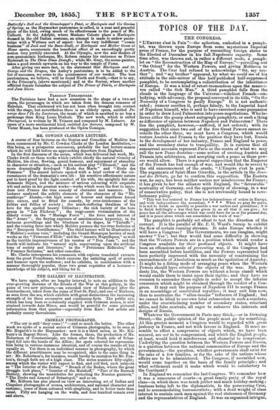MR. COWDEN CLARKE'S LECTURES.
A course of four lectures on the Genius and Comedies of Moller° has been commenced by Mr. C. Cowden Clarke at the London Institution,— this being, as a prospectus announces, probably the last lecture-season which he will hold before an approaching departure from England.
In the first discourse of the series, which was delivered last week, Mr. Clarke dwelt on those works which exhibit chiefly the natural vivacity of Moliere' his clear, flowing, genial humour, and enjoyment of absurdity in character or situation,—such as his earliest play " rEtourdi," and the more dramatically developed "Ecole des Maria" and " Ecole des Femmes." The second lecture opened with a brief review of the cir- cumstances of the dramatist's own life : his sensitive affectionate nature put to hard proof by the light conduct of his wife, the sprightly fair one Armande Bejart, and the mixture of serious colouring with exquisite wit and satire in his greatest works—works which were the first to intro- duce into France the true comedy of character and manners. The lecturer analyzed the subtile elements of the character of the "Mi- santhrope" Alceste,—his high sense of honour and manliness forced into excess, and so fitted for comedy, by over-intolerance of the foibles and follies of society ; the much-suffering thraldom of his love for the spoiled beauty Celimene the rich variety of the bore genus in "Lea Facheux ; the tr4i-comie victimization of the elderly wooer in the "Manage Force. ; the force and interest of the" Avare " ; the flaying exposure of sanctimonious hypocrisy, in its tortuous grovellings and the blindness of its dupes, in Tartuffe" ; and the roaring farce into which Moller() pursues the too-true fooleries of the "Bourgeois Gentilhomme." The third lecture will be illustrative of " Moliere's serious vein," including the Grand-Monarque heroics of such works as the " Princesse d'Elide " and the " Amants Magnifiques," as well as the terrible impressiveness of his version of "Don Juan ' ; and the fourth will indicate his "natural style supervening upon the artificial tone of society and literature," in the " Precieuses Ridicules," the " Femmes Savantes," and other comedies.
Mr. Clarke intersperses his comments with copious translated extracts from the great Frenchman, which exercise the unfailing spell of genius and humour upon the audience ; and he exhibits, in combination with a manner thoroughly popular, those two great requisites of a lecturer— knowledge of his subject, and liking for it.


























 Previous page
Previous page